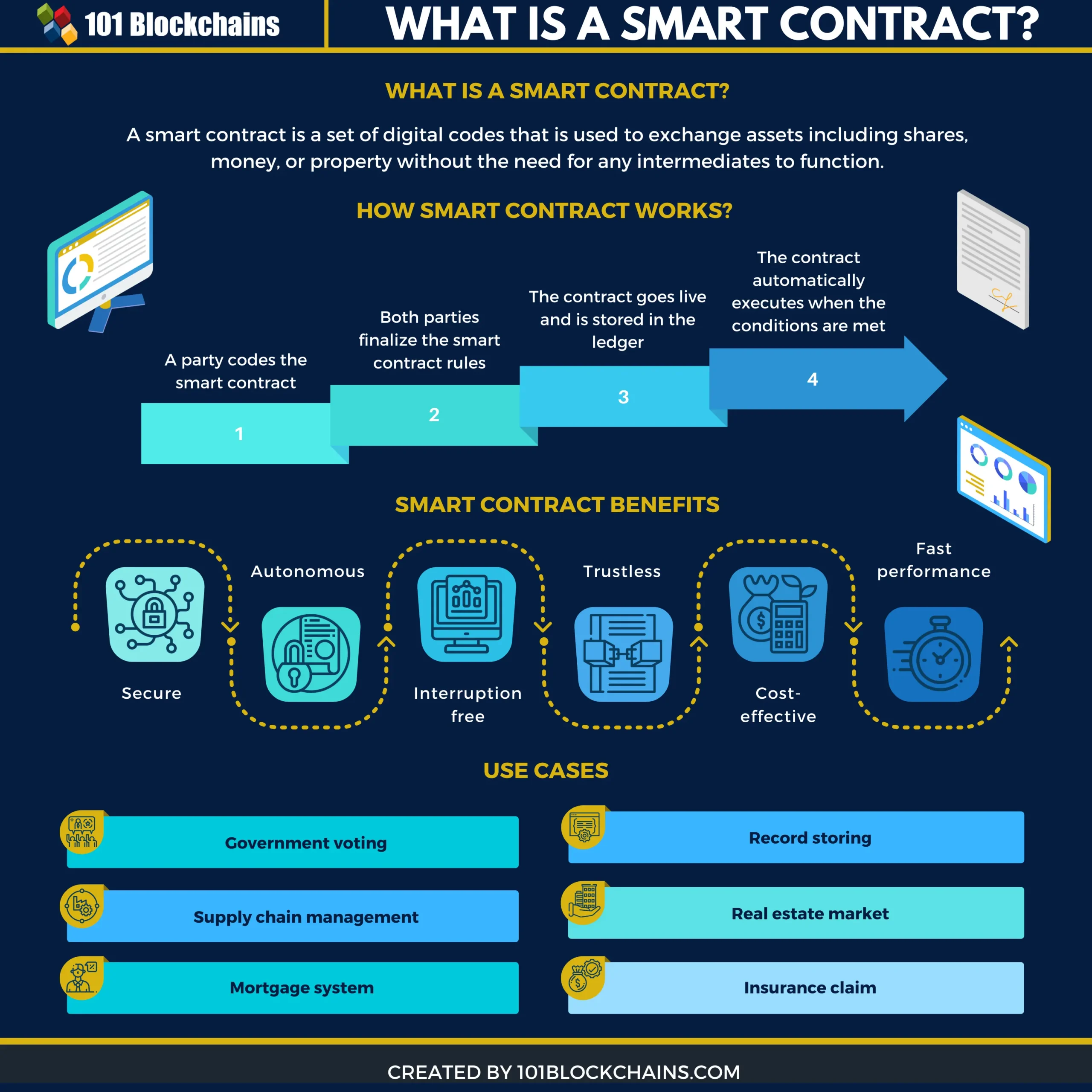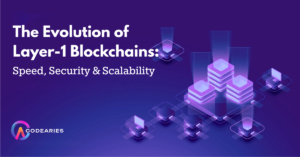In the fast-evolving realm of blockchain technology, ensuring the security of smart contracts is a critical necessity. These self-executing contracts, which form the backbone of decentralized applications (dApps) and decentralized finance (DeFi) systems, require thorough auditing to prevent breaches and safeguard digital assets. Traditional manual audits, while effective, can be time-consuming and costly. To address these challenges, AI-powered auditing tools are stepping up, offering faster, more scalable, and highly accurate solutions for securing smart contracts.
In this article, we’ll explore the transformative role of AI in smart contract auditing, the benefits of these cutting-edge tools, and how they are reshaping blockchain security.
What is a Smart Contract?
A smart contract is a digital agreement where the contract terms are encoded into software and automatically executed once predefined conditions are met. Unlike traditional agreements that rely on intermediaries, smart contracts operate autonomously on blockchain platforms such as Ethereum. They are designed to be immutable and tamper-proof, ensuring that once a contract is deployed, its logic cannot be altered. FMI shares that the smart contract market is predicted to be valued at US$ 230.2 million in FY 2024. The market is expanding at a robust 23.80% CAGR over the next ten years and lead the market to US$ 1,946.78 million by 2034.

However, this immutability also presents a challenge: any coding error or vulnerability becomes permanent, making rigorous pre-deployment auditing essential. Without thorough auditing, smart contracts can be exploited by attackers, leading to financial losses and compromised trust.
Common Vulnerabilities in Smart Contracts
Even though smart contracts are hailed for their security, they are not without risks. Here are some of the most common vulnerabilities that can compromise a contract’s integrity:
- Reentrancy Attacks: This occurs when a malicious actor repeatedly calls a function within a contract before the previous call is finished, enabling them to manipulate the system and, in some cases, steal funds.
- Integer Overflows/Underflows: Contracts can miscalculate numerical values when these exceed or drop below the storage limits, potentially allowing attackers to exploit the contract for fraudulent gain.
- Denial of Service (DoS): An attacker can disrupt a smart contract’s normal functionality, halting key operations and causing service failures.
- Gas Limit Issues: Contracts that are not optimized for gas usage can lead to high transaction fees or failures due to insufficient gas.
These vulnerabilities highlight the importance of comprehensive auditing to ensure that contracts are safe from exploitation.
The Evolution of Smart Contract Auditing
Historically, smart contract auditing was a manual process, requiring blockchain security experts to comb through lines of code. These audits, while thorough, took considerable time and effort. As blockchain projects scaled and adoption increased, the demand for faster, more scalable auditing methods grew.
AI-powered auditing tools have emerged to address these challenges. By using advanced machine learning models, these tools can quickly detect vulnerabilities and analyze complex codebases more efficiently than traditional human auditors. This marks a significant shift in the way blockchain security is approached.
How AI is Enhancing Smart Contract Auditing
AI plays a pivotal role in revolutionizing smart contract auditing by automating the detection of vulnerabilities. AI-powered tools can process vast amounts of code at speeds far beyond human capabilities, offering a more thorough analysis in a fraction of the time. These tools are trained on extensive datasets of past vulnerabilities, enabling them to recognize patterns and flag potential issues that human auditors might miss.
An additional benefit of AI tools is their ability to uncover zero-day vulnerabilities—those previously unknown flaws that traditional methods might overlook. By automating the routine, time-intensive aspects of auditing, AI frees up human auditors to focus on more complex and nuanced security concerns.
Benefits of AI-Powered Auditing Tools
The introduction of AI into smart contract auditing has brought about several key advantages:
- Speed and Efficiency: AI can audit large volumes of code in minutes, as opposed to the weeks that manual audits might take.
- Improved Accuracy: AI’s pattern recognition capabilities allow it to spot hidden vulnerabilities, reducing the chances of human error.
- Scalability: As the number of smart contracts continues to grow, AI tools can handle the increased volume of audits without sacrificing quality.
- Cost Reduction: Automating part of the auditing process lowers costs, making security services more accessible to smaller projects and startups.
These benefits make AI-powered tools a game-changer for blockchain developers seeking to enhance the security of their smart contracts.
How AI Detects Smart Contract Vulnerabilities
AI-powered auditing tools rely on several advanced techniques to identify vulnerabilities in smart contracts:
- Pattern Recognition: By studying previous exploits, AI models can identify patterns that indicate security risks within the code.
- Natural Language Processing (NLP): AI uses NLP to understand the logic and intent behind smart contract functions, ensuring the contract performs as expected.
- Anomaly Detection: By analyzing the normal behavior of smart contracts, AI can identify irregularities that signal potential vulnerabilities or exploits.
This combination of techniques allows AI to provide a more comprehensive and proactive approach to security auditing.
Machine Learning’s Role in Auditing
At the core of AI-powered auditing tools is machine learning (ML). These tools are trained on vast datasets of previously audited smart contracts, learning to recognize vulnerabilities based on historical data. Over time, the models become increasingly accurate, allowing them to detect more subtle security issues.
Machine learning also enables the creation of specialized models tailored to specific industries or types of contracts. For example, a model trained specifically on DeFi contracts may be better equipped to detect financial security vulnerabilities than a more general model.
Auditing Workflow with AI Tools
The process of auditing a smart contract with AI typically follows a systematic workflow:
- Code Input: The smart contract code is uploaded into the AI tool for analysis.
- Initial Scan: The AI performs an initial scan to flag common vulnerabilities.
- In-Depth Analysis: Machine learning models dive deeper into the code, analyzing it for more sophisticated issues or exploits.
- Report Generation: A detailed report is produced, outlining any vulnerabilities discovered, their severity, and suggestions for fixing them.
- Human Review: Expert auditors review the AI’s findings to ensure accuracy and completeness.
This hybrid process leverages both AI’s speed and human expertise for a comprehensive security audit.
Popular AI-Powered Smart Contract Auditing Tools
Several AI-powered tools are now widely used to enhance smart contract security, including:
- MythX: Focuses on Ethereum contracts, using AI-driven static and dynamic analysis to uncover vulnerabilities.
- CertiK: Known for combining AI with formal verification methods, CertiK provides rigorous auditing for blockchain projects.
- OpenZeppelin Defender: Specializes in real-time security monitoring and auditing, powered by AI.
- Slither: A popular static analysis tool that helps developers identify vulnerabilities early in the development process.
These tools represent the forefront of AI-driven blockchain security solutions, each offering unique strengths and features.
Real-Life Applications of AI-Powered Tools in Smart Contract Auditing
AI-powered tools are transforming the smart contract auditing process, enhancing speed, accuracy, and security. Their real-world applications span several industries, from finance to healthcare, delivering tangible benefits. Here’s how these AI-driven auditing tools are making a difference:
DeFi (Decentralized Finance) Platforms
- Risk Identification: In DeFi ecosystems, AI-powered tools can quickly scan smart contracts to identify common vulnerabilities, such as reentrancy attacks, integer overflows, and denial-of-service (DoS) threats. By flagging these issues early, AI helps prevent catastrophic exploits that could lead to loss of funds.
- Contract Optimization: AI tools can analyze smart contract code and recommend optimizations for better efficiency, including reducing gas fees and eliminating unnecessary complexities. This ensures smoother operations for DeFi platforms and improved user experiences.
- Real-Time Monitoring: AI solutions continuously monitor DeFi smart contracts, detecting anomalies or suspicious activities. This proactive approach helps safeguard user assets and prevent exploits before they happen.
NFT (Non-Fungible Token) Marketplaces
- Authenticity and Provenance Checks: AI tools can examine metadata, past transactions, and provenance to verify the legitimacy of NFTs. This helps buyers ensure they are investing in genuine digital assets, protecting them from fraud.
- Plagiarism Protection: In the growing NFT space, AI can detect instances of copied or plagiarized digital artwork, helping to maintain the integrity of the marketplace and protect creators’ intellectual property.
- Royalty Enforcement: By auditing NFT smart contracts, AI tools ensure that creators receive the correct royalties from secondary sales. This is vital for ensuring artists are compensated fairly for their work.
Supply Chain Management
- Product Authenticity Verification: AI auditing tools can trace a product’s origin and journey through a supply chain, ensuring the authenticity of goods and compliance with ethical sourcing standards. This enhances transparency and builds trust in the supply chain.
- Quality Assurance: AI can monitor smart contracts in real-time, ensuring that products meet required quality standards. By identifying issues early, companies can prevent faulty products from reaching the market.
- Sustainability Tracking: AI tools can track environmental metrics across supply chains, helping organizations ensure their operations meet sustainability goals, such as reducing carbon footprints or adhering to eco-friendly practices.
Gaming and the Metaverse
- Transparency and Fairness: In gaming environments, AI tools can audit smart contracts that govern in-game rules and assets. This ensures transparency, preventing cheating or manipulation, and maintains fair gameplay for all participants.
- Virtual Asset Security: With the increasing value of digital assets in the metaverse and gaming spaces, AI-powered auditing tools help protect these assets from fraud or theft, safeguarding both player investments and the in-game economy.
- Behavioral Analysis: AI can monitor player behaviors to detect suspicious activities or attempts to exploit the system. This contributes to a safer and more enjoyable gaming experience.
Healthcare
- Data Privacy Protection: AI tools play a critical role in securing healthcare smart contracts, ensuring patient data is stored and shared securely. These tools identify potential vulnerabilities, ensuring compliance with strict data privacy regulations like HIPAA.
- Efficient Clinical Trial Management: AI-powered auditing can automate aspects of clinical trials, such as verifying patient data and ensuring the integrity of contracts related to trial protocols. This leads to more efficient trials and accelerates medical research.
- Supply Chain Integrity in Healthcare: AI auditing tools ensure that the medical supply chain operates with transparency and integrity, preventing the entry of counterfeit drugs or medical equipment into the market.
Conclusion
AI-powered auditing tools are reshaping the landscape of smart contract security by offering faster, more accurate, and scalable solutions. As blockchain technology continues to grow, the demand for robust, efficient auditing methods will only increase. By automating routine tasks and identifying zero-day vulnerabilities, AI is enhancing the security of blockchain ecosystems while reducing costs and time for developers.
Looking forward, AI will continue to play an increasingly critical role in safeguarding digital assets, preventing exploits, and ensuring the secure execution of smart contracts across decentralized platforms
FAQS
What are the best practices for smart contract auditing?
Smart contract auditing involves several best practices. Start with a thorough code review to identify errors and vulnerabilities, followed by automated testing to catch common security issues. Manual auditing is essential to catch subtle problems, and formal verification ensures mathematical correctness.
What are the AI tools for auditing?
AI tools like Mythril and Slither are used for vulnerability detection, while ChainSecurity focuses on formal verification of smart contracts. OpenZeppelin Defender automates security management, leveraging AI algorithms to monitor and update contracts for security.
What are the four types of AI software?
The four types of AI are: Reactive Machines, which perform specific tasks without learning; Limited Memory AI, which learns from past data (e.g., self-driving cars); Theory of Mind AI, which could understand emotions; and Self-Aware AI, a hypothetical form with consciousness.
What is AI and its tools?
AI refers to systems that can perform tasks requiring human intelligence, like decision-making and learning. Key tools include TensorFlow and PyTorch for machine learning, IBM Watson for natural language processing, and OpenAI GPT for text generation. These tools are widely used to develop AI applications across industries.







